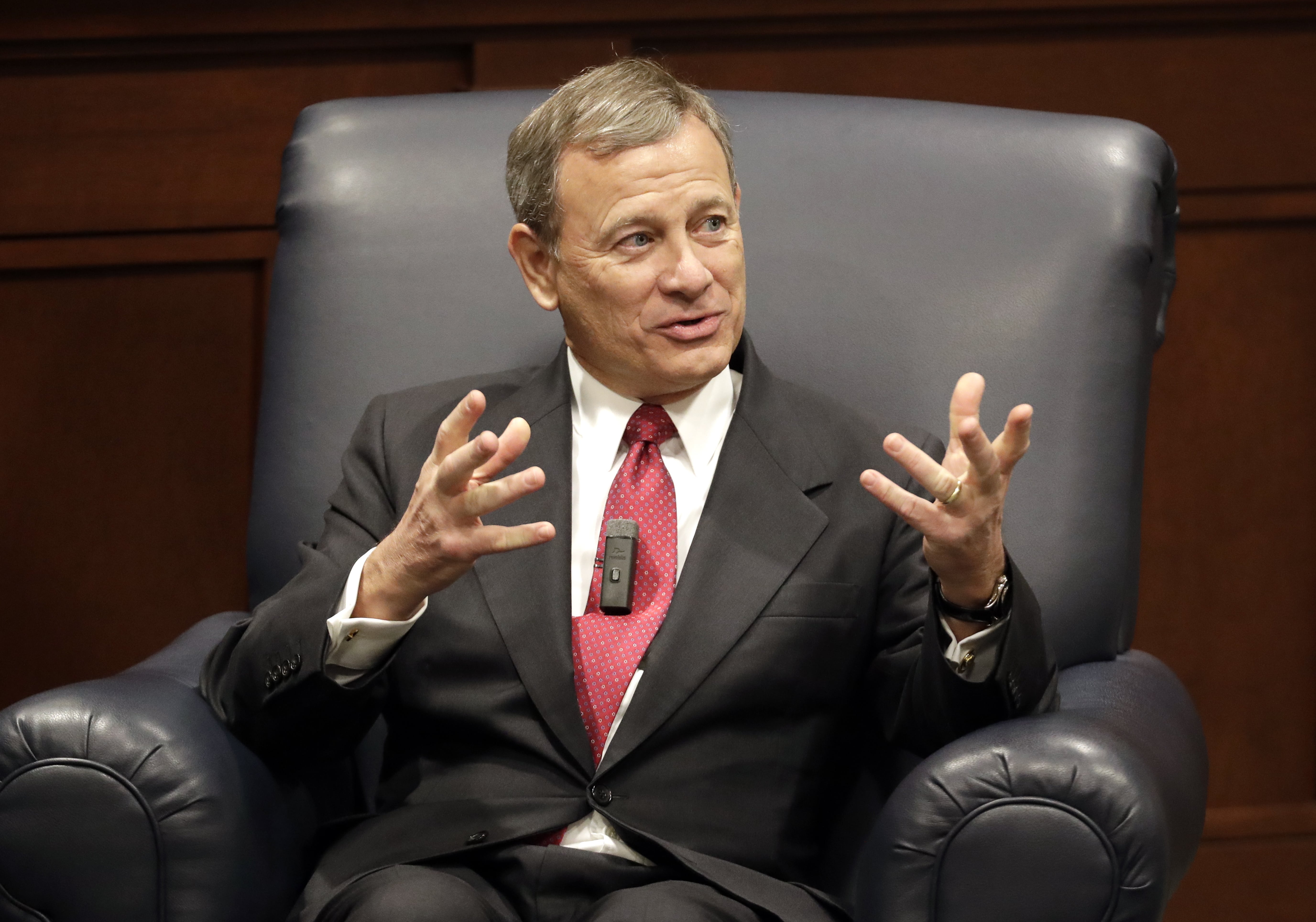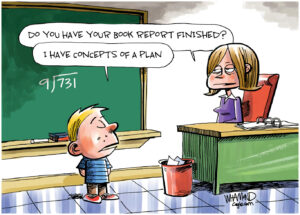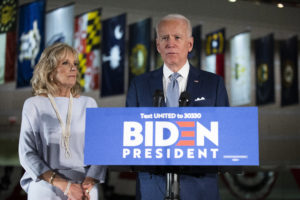John Roberts’ Dark Legacy of Voter Suppression
The Bush appointee and archconservative is the new swing vote on the Supreme Court. That bodes ill for the future of American democracy. Supreme Court Chief Justice John Roberts (Mark Humphrey / AP)
Supreme Court Chief Justice John Roberts (Mark Humphrey / AP)
This piece originally appeared on The Progressive.
When Chief Justice John Roberts steps down from the Supreme Court years from now, how will he be remembered?
Many of his current admirers think (or at least hope) that it will be for defending judicial independence against the Trump Administration’s disdain for the rule of law. He did, for example, cast the deciding votes to uphold the Affordable Care Act’s individual mandate in 2012 and in last year’s decision preventing the Trump Administration from adding a Census question about citizenship.
But whatever examples there will be of Roberts serving as guardian of the third branch of government, his legacy will also have a darker side.
Among all jurists of the twenty-first century, Roberts arguably will go down as the foremost enabler of voting manipulation and voter suppression. He will be remembered for writing the 5-4 majority decision earlier this year in Rucho v. Common Cause, holding that federal courts have no jurisdiction over political gerrymandering—the practice of drawing state voting districts to benefit the political party in power.
Among all jurists of the twenty-first century, Roberts arguably will go down as the foremost enabler of voting manipulation and voter suppression.
Perhaps even more so, Roberts will be remembered for authoring the majority opinion in the 5-4 ruling that decided Shelby County v. Holder in 2013. In Shelby County, the court invalidated a key provision of the Voting Rights Act (VRA) that required state and local jurisdictions, mostly in the South, with histories of egregious voter discrimination to obtain advance federal approval—known as “preclearance”—before making changes to their election procedures.
As the United States heads into the 2020 election cycle, we can expect new rounds of voter suppression, all made easier by Shelby County.
This month, the New York City-based Brennan Center for Justice released a report that found at least 17 million people were removed from state voting rolls from 2016-2018. Many, the report acknowledges, were deleted for legitimate reasons, such as moving out-of-state, or because they had died. But many others were removed as a result of faulty data collected by state agencies, or simply because they had failed to vote in previous election cycles.
Significantly, the Brennan Center found that the median purge rate in jurisdictions that were subject to VRA preclearance rules prior to Shelby County was 40 percent higher than in non-pre-clearance jurisdictions.
Purges, moreover, are just part of the suppression scourge that Shelby Countyhas aggravated. Since 2010, other suppression techniques have proliferated, including the imposition of rigid voter I.D. requirements, restrictions on registration drives and early voting, and reductions in the number of polling places, especially in red states controlled by Republican legislatures and governors, with disproportionate impacts on minority voters.
The Voting Rights Act was signed into law in 1965, at the height of the civil rights movement. It was enacted to enforce the Fourteenth and Fifteenth Amendments, and to counter the post-Reconstruction methods of black disenfranchisement that were common throughout the South in the form of poll taxes, literacy tests, “whites-only” primaries, and other repressive measures.
The VRA was immediately challenged in court by South Carolina, which was one of seven states initially covered by its preclearance procedures as a result of literacy and property-ownership tests it used to hold down African-American voter turnout. The state’s tests were suspended following the VRA’s passage, and it was precluded from amending its election laws without federal preclearance.
In one of the most important majority opinions of his storied career, South Carolina v. Katzenbach (1966), Chief Justice Earl Warren upheld the constitutionality of the VRA in its entirety.
In the years following Katzenbach, Congress reauthorized the VRA in 1970, 1975, 1982, 1992, and 2006, finding each time that the act, including the preclearance process, was needed to protect minority rights. The 2006 reauthorization, which extended the VRA for another twenty-five years, was especially emphatic, with the Senate voting to renew the legislation by a 98-0 vote, and the House by a margin of 390-33.
Shelby County, located in central Alabama, believed the preclearance requirements infringed on states’ rights. In 2008, the Justice Department refused to preclear an attempt by the city of Calera, located in the county, to redraw one of its electoral maps to decrease the percentage of black voters in the district from 70.9 percent to 29.5 percent. Two years later, the county sued former Attorney General Eric Holder on Calera’s behalf.
By the time the case reached the Supreme Court in 2013, Roberts’ negative assessment of the VRA’s preclearance requirements was well established. In 2009, in an otherwise obscure voting rights case (Northwest Austin Municipal Utility District v. Holder) involving the elected board of a municipal water district in Texas, Roberts warned that unless Congress updated the formula used in the VRA to determine which jurisdictions should be subject to the preclearance process, the Supreme Court might overturn the process altogether.
Roberts’ Shelby County opinion fulfilled that warning.
Roberts’ opinion in Shelby is remarkable not only as an exercise of extreme judicial activism, but because the Chief Justice took the position that “things have changed dramatically” since passage of the VRA, and that the evils of racial discrimination in voting in the South have largely been rectified.
In reality, as Justice Ruth Bader Ginsburg wrote in her dissenting opinion, Congress was fully justified in reauthorizing the VRA. Between 1982 and 2006, she observed, the DOJ had blocked more than 700 proposed voting changes based on a determination the changes were discriminatory.
Roberts’ opinion in Shelby is remarkable not only as an exercise of extreme judicial activism, but because the Chief Justice took the position that the evils of racial discrimination in voting in the South have largely been rectified.
As damaging as the Shelby County ruling is, it’s important to note that the decision did not invalidate Section 2 of the VRA, which permits lawsuits to be filed by private parties to contest discriminatory voting practices. Unlike the preclearance process, however, the burden of proof in Section 2 actions falls on the victims of discrimination, not the perpetrators. So, too, do the expenses of litigation.
The federal government is also empowered to file lawsuits under Section 2 of the VRA. But to-date, the Trump Justice Department has not filed a single enforcement case. (The last federal enforcement action was initiated by the Obama Administration in January 2017, just days before Trump’s Inauguration.)
In a lengthy analysis published last year, the U.S. Commission on Civil Rights decried the remedies offered by Section 2 lawsuits, concluding: “In the face of ongoing discrimination in voting procedures enacted by states across the country, enforcement and litigation under Section 2 of the VRA is an inadequate, costly, and often slow method for protecting voting rights.”
Nonetheless, around the country today, as the Brennan Center reports, a variety of plaintiffs are litigating voting rights cases in Alabama, Georgia, Texas, North Carolina, and several other states. Some likely will succeed, and some will fail. All will encounter uphill battles, made more uncertain and expensive by the jurisprudence of the Chief Justice of the Supreme Court.
Your support is crucial…With an uncertain future and a new administration casting doubt on press freedoms, the danger is clear: The truth is at risk.
Now is the time to give. Your tax-deductible support allows us to dig deeper, delivering fearless investigative reporting and analysis that exposes what’s really happening — without compromise.
Stand with our courageous journalists. Donate today to protect a free press, uphold democracy and unearth untold stories.









You need to be a supporter to comment.
There are currently no responses to this article.
Be the first to respond.